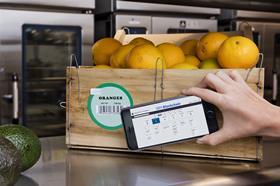
Increasing numbers of food companies and retailers are experimenting with blockchain, according to Ecovia Intelligence, organiser of the Sustainable Food Summit in Amsterdam on 6-7 June, when delegates will learn more about the benefits of this new technology.
Ecovia believes blockchain will bring multiple sustainability benefits to the food industry in the years to come, including providing transparency on transactions throughout the supply chain.
Blockchain helps mitigate the risk of food fraud and safety, with the ability to pinpoint contaminated batches, and allowing safe products to remain on the shelves and out of landfill. The technology also speeds up transactions, enabling farmers to get paid quicker, and prevents price coercion and retroactive payments.
Carrefour recently became the first European retailer to introduce blockchain for food products, believing the technology will revolutionise its supply chains, and now plans to expand the technology from chickens to items including oranges and tomatoes.
Meanwhile, Walmart is working with Nestle, Dole Food, Unilever and Tyson Foods on blockchain pilot projects.
“The retailer says a 1 percent reduction in food-borne illnesses in the US could generate an additional US$700m in increased productivity,” Ecovia stated in a press release. “Walmart believes blockchain will do for transparency what the internet has done for communication. In one of its blockchain projects, it took 2.2 seconds to trace mangoes to the farm. Without blockchain, this would take the retailer six days, 18 hours and 26 minutes to identify the original farm.”
According to Ecovia, blockchain has the power to change the dynamics of the food industry. “Like Uber and Airbnb, it can eliminate middlemen and reduce product prices,” it stated. “The technology could shift power away from the multinationals and trading houses, which currently set pricing terms, dictate product varieties and quality specifications. By removing intermediaries, growers can connect directly with retailers, foodservice operators, and even consumers. Small producers are likely to benefit most from fairer prices and a wider customer base.”
However, the biggest impact is likely to be seen at the consumer level, according to Ecovia. “Consumers are becoming increasingly discerning when buying food products, seeking information on environmental, ethical and health attributes,” it said. “Blockchain is a platform that provides all these informational needs.”
For Ecovia Intelligence, it is not a question of “if” blockchain can build a more sustainable food industry, but “how quickly”.






No comments yet